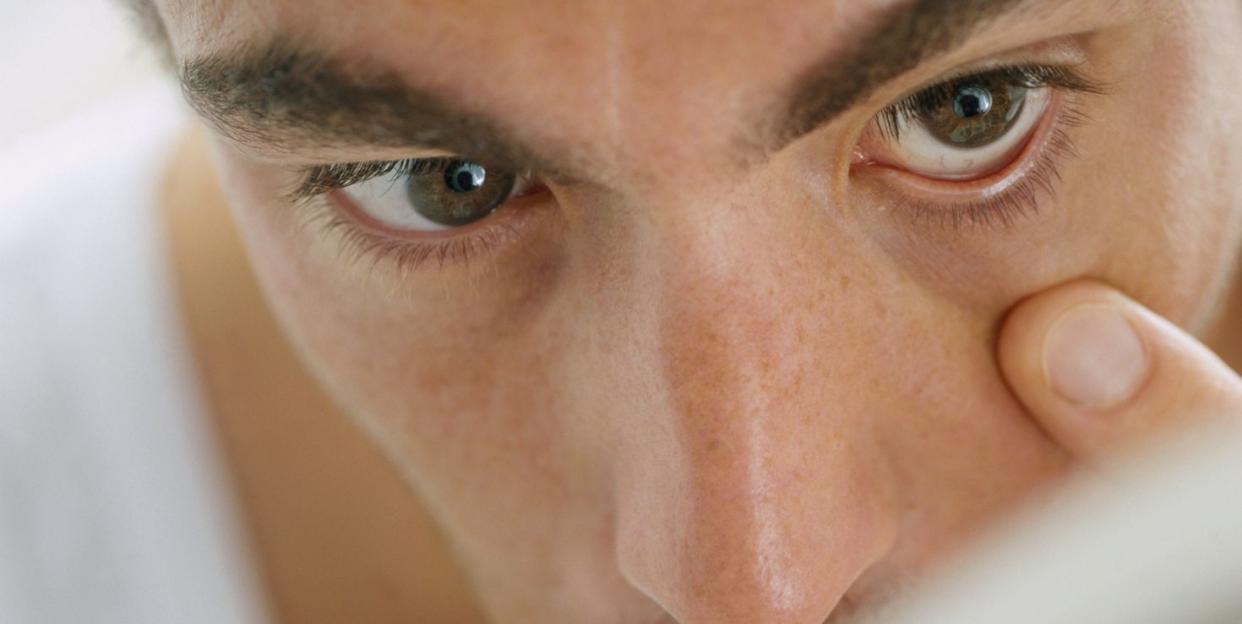How to stop your eyes from twitching

A twitchy eye can be annoying, uncomfortable and even embarrassing if it crops up at the wrong moment, but muscle twitches are usually completely harmless and often go away on their own. Eyelid twitching is common and is often caused by stress and being overtired - but what if your eye twitches persistently and when should you be concerned?
Dr Louise Wiseman looks at eye twitching causes, treatments and prevention:
Why is your eye twitching?
Eyelid twitching is a repeated involuntary spasm of the eyelid muscles. The medical name for an eyelid spasm is ‘blepharospasm’ and the tiny involuntary spasms or ‘fasciculations’ of a small group of muscles is called ‘myokymia’. Simple eyelid twitching usually involves one eye only, most commonly the upper eyelid. Women seem to be more often affected than men.
Simple eyelid twitching can be barely noticeable or downright annoying and most likely passes in a few minutes, but may recur repeatedly over a few hours or even days. You might feel like you are going through a phase of eye twitches and it can make you feel self-conscious, even though other people rarely notice.
What causes eyelid twitching?
Experts don't really know what causes muscle spasms in the eye area. However, the following factors can make eyelid twitching worse, or more likely:
Tiredness, exhaustion and lack of sleep
Eye strain
Bright light
Caffeine
Nicotine
Stress
Wind and air pollution
Irritation to the surface of the eye or in the eyelid
Medicines that may cause eye twitching
Some medication can cause eye twitching but this would most likely involve both eyes, unlike the pesky eye twitching that occurs intermittently to everyone. These include certain migraine medicines, antipsychotic medicines, dopamine related medicines, calcium channel blockers (used for high blood pressure) and some antidepressants and antihistamines.
If you are concerned that your medication is making your eyes twitch, do not suddenly stop taking it – just discuss with your doctor if you think there is a problem.
Eyelid twitching treatment
Most twitchy eyelid cases resolve naturally and can often be treated by getting enough sleep, reducing stress, and limiting your caffeine intake. Try the following:
✔️ Rest and relaxation such as meditation can help to minimise stress.
✔️ Reduce your caffeine, alcohol and nicotine intake.
✔️ Monitor your screen time to prevent eye tiredness.
✔️ If your eyes feel dry, try over-the-counter eye lubricant drops from the pharmacy.
✔️ Sufficient magnesium in the diet may help, so aim to consume more green leafy vegetables, pulses and nuts.
When should you worry about eyelid twitching?
For most people eyelid twitching is nothing to worry about and will sort itself out over time. However if any of the following symptoms occur, make an appointment with your GP:
If twitching goes on for more than two weeks.
If your eye(s) close completely or you have difficulty opening your eyes.
If other parts of your face or body start to twitch.
If the eye is red or swollen or develops a discharge.
If one or both eyelids start drooping.
What will the doctor do?
The doctor will talk to you about possible causes of your twitchy eye and may discuss what can be changed in your lifestyle to reduce the frequency. They will most likely reassure you that there is nothing to worry about and that it will resolve on its own.
Your doctor may also examine the eye area. Sometimes a drop will be placed in the eye to see if there is a scratch or foreign body. If there is a sign of infection this can be easily treated. Your doctor will then decide if referral to a neurologist or ophthalmologist is required.
Eyelid twitching complications
Sometimes your eye may twitch if there is a local problem within the eye. These can all be easily treated by your doctor, who may refer you to a specialist:
Blepharitis – inflammation of the eyelids.
Corneal abrasion or a scratch – from damage to the eye or an infection.
Dry eye – this could be Sjogrens syndrome or the side-effect of certain medications.
Uveitis – inflammation of the middle layer of tissue in the eye.
Very rarely, eye spasms can be part of a brain or nerve disorder including benign essential blepharospasm caused by dystonia, Bell’s palsy, hemifacial spasm, multiple sclerosis, Parkinson’s disease, Tourette’s syndrome or specific movement disorders. When eyelid twitches are the result of a more serious condition, they’re usually accompanied by other symptoms.
Recurrent eye twitching
If your eyelids have been twitching for months with no other symptoms, it is most likely due to long term stress and lifestyle habits. Look at what you can change and make sure that you build relaxation into your timetable. Speak to your doctor if you are at all worried.
Last updated: 21-01-2021
You Might Also Like


